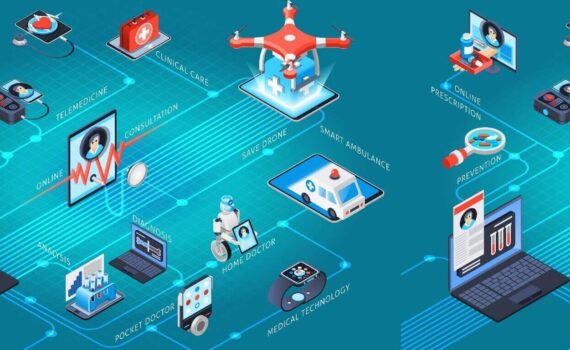With an age of more than 60 years, Artificial Intelligence(AI) is no more an unheard term, and has proved to be a better solution specially in the field of healthcare defining itself as “use of computers to model intelligent behavior with minimal human intervention”. We live in a digital age where Terabytes or Petabytes of information is poured daily in computers, especially in the corporate world in which many companies are competing to get their customer’s attention, and answer this question – How can I use this data to analyze my consumer’s behavior? And luckily, we are advancing in that direction. Thanks to AI!
So where is AI in Healthcare? Possibly at every stage.
Human cognitive functions are difficult to mimic but the engines of AI reverse engineer the responses received from the users, integrate that data into different models and provide positive results in all fields. It gave a paradigm shift to healthcare by evolving the analytical techniques and applying them across all the steps of patient journey like an attempt to make diagnosis accurate, to analyze the Electronic Health records (EHR), robots like Da Vinci efficiently assisting surgeons in performing minimally invasive surgeries. Improvements are seen in robotic surgeries as they are getting a nod by the regulatory authorities for example a robot Versius used in NHS hospitals performing surgeries and thus reducing post-operative complications.
Here are few areas where we can spot AI making significant improvements:
- Drug discovery and biomarker development – finding a correct molecule happens to be the biggest challenge because of the vast size of the chemical space (estimated to be in the order of 1060 molecules). Only 10% candidates can make it up to Phase 2 clinical trials and so on. A fascinating success of use of IBM Watson in clinical trials and biomarker development – its use to identify the altered RBP (RNA-binding proteins) linked to ALS (Amyotrophic lateral sclerosis)- a neurodegenerative disease with no treatments. Many such examples quote the future assurance about the use of AI in all stages of drug discovery.
- Clinical diagnosis- estimating the occurrence of a disease can benefit a patient’s prognosis by tenfold and Google Health displayed one such example by developing an AI program which will help the doctors by giving them a 48-hour head start in treating acute kidney failure. The company also developed a program for lung cancer where the AI model will use the present CT scans along with the past scans (if any) for malignancy prediction. These algorithms which can grab and predict the patient data can do miracles in improving the lifespan and quality of health of patients by making diagnosis at the right time with accuracy.
- Patient Adherence – companies are turning towards developing AI systems not only to make virtual nursing assistants but also to develop a complete medication management system for patients right from placing orders to keep a check on medication doses, frequency and adherence. One such clinical trial was conducted to check the feasibility, acceptability and accuracy of the AiCure platform (an AI based patient support platform used to analyze patient’s behavioral data) in patients who were treated for opioid dependency with Zubolsv over the course of 12 weeks.
- Another interesting use of AI which gives a different picture to the future of clinical trials is assessing patients’ adherence in virtual clinical trials – especially in the cases of depressive disorders where patients can live at home and an AI system can assess dose, adherence, facial and vocal expressivity to keep a check on depression.
Amidst all the above, now companies are also struggling to find a cure i.e. a vaccine for COVID-19. But we can say that there is more than just ‘curing’ the patient here. It requires a good system to track the patient and make sure that the spread becomes as less as possible till we get a breakthrough for the vaccine.
Some interesting applications seen by countries trying to cope with a pandemic:

Despite such great examples, it will be challenging for the healthcare workforce to adapt to AI. It will not be able to replace the clinicians completely but along with a proper regulatory system and integration, it can be a great helping hand where it can set examples on one side contributing to decrease the chances of the disease and on the other hand by creating an accurate drug to target the disease. A blend of improvement in the regulations and an attempt by companies to deliver the best will shape up the future of healthcare by big data, robotics, machine learning (ML), Natural language processing (NLP) which shall hopefully influence millions of people affecting the entire cycle of patient journey.
References:
- https://www.sciencedirect.com/science/article/pii/S0016510720344667
- https://link.springer.com/article/10.1007/s00401-017-1785-8
- https://health.google/health-research/
- https://clinicaltrials.gov/ct2/show/NCT02243670
- https://www.clinicaltrialsarena.com/news/science-37-aicure-virtual-trials/
- https://www.merckgroup.com/en/research/science-space/envisioning-tomorrow/precision-medicine/generativeai.html
- https://aicure.com/
- https://www.theguardian.com/society/2018/jul/04/robots-nhs-surgeons-keyhole-surgery-versius
- https://www.ncbi.nlm.nih.gov/pmc/articles/PMC7315944/
- https://www.thelancet.com/journals/landig/article/PIIS2589-7500(20)30142-4/fulltext






